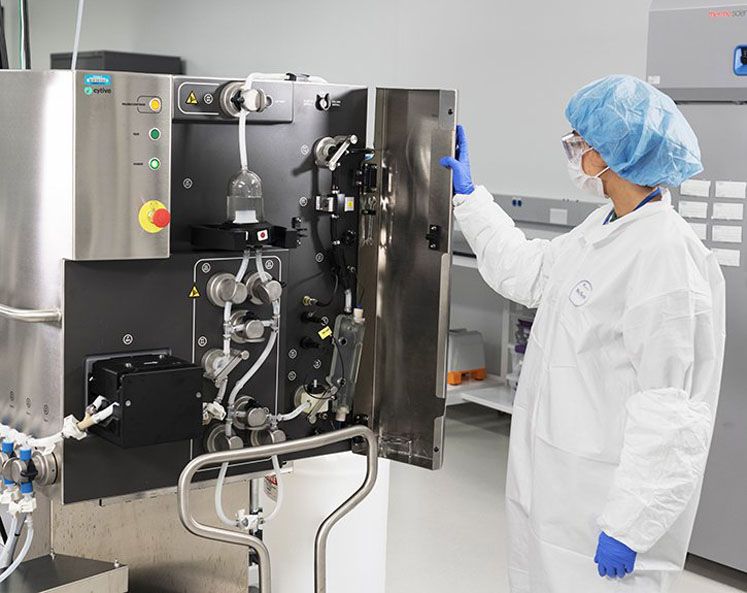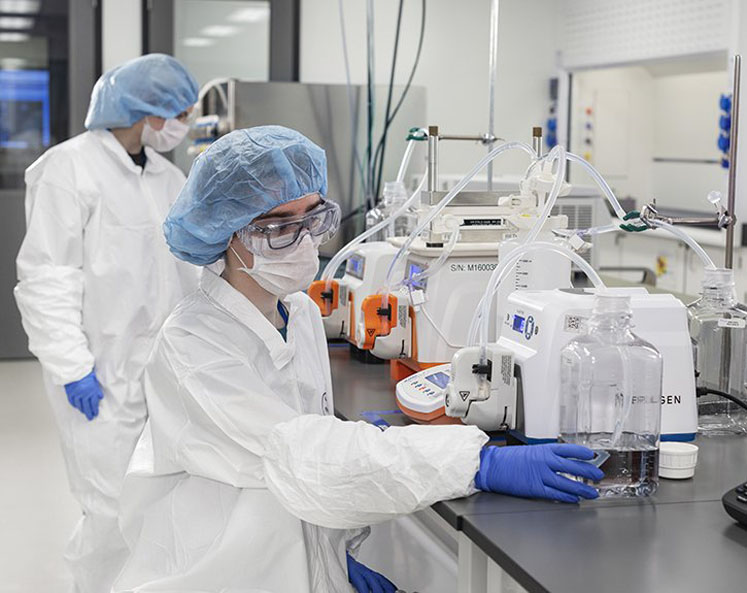However, this accelerated development — and the ultimate regulatory approval of mRNA drugs — hinges on advanced nucleic acid testing to fully characterise these molecules to ensure their identity, integrity and purity
mRNA therapeutics are redefining what’s possible in pharmaceutical development, offering a potential pathway to address previously undruggable disease targets.
During the COVID-19 pandemic, two approved mRNA-based vaccines were thrown into the spotlight. Now, owing to the potential of mRNA therapeutics to produce nearly any protein or peptide in the body, the field has ballooned; hundreds of clinical trials are now under way involving products developed to treat a wide range of diseases.
The field has become more exciting than ever, with recent breakthroughs including a self-replicating construct to increase the power of a COVID-19 vaccine, mRNA-based cancer therapies and the approval of the first-ever CRISPR-based drug to treat beta-thalassemia.1,2
The design of mRNA therapeutics offers many advantages compared with other drug platforms; they are effective, well-tolerated and do not need to enter the nucleus to be functional. In addition, mRNA therapeutics are produced using a streamlined manufacturing process that primarily involves the production of nucleic acid strands.
This rapid, robust system proves great promise; but, to consistently maintain the highest quality products, all development and manufacturing activities must be grounded in streamlined analytical methods.
These procedures help companies to understand the impact of their materials and process conditions on manufacturing outcomes and ultimately ensure that each batch of mRNA is safe and effective.
The goal of mRNA testing
All drug producers aim to develop the most efficient testing processes that ensure the avoidance of low-quality starting materials, the early detection of failed batches and the delivery of the highest quality product.
A range of analytical testing services is necessary to assess each mRNA batch, with the number and complexity of tests evolving constantly.
Analytical testing assesses the four major structural features of the mRNA molecule: the 5' cap, poly(A) tail, UTRs and coding sequences, which may drastically impact mRNA performance and manufacturability.
Assessment of these structural features — and tests for the specific product- and process-related impurities that may be present in the final mRNA drug substance — result in data that fall into three major categories of critical quality attributes (CQAs) for mRNA as a drug substance.

These are identity, integrity and purity. Developers use a battery of tests to measure endpoints in these categories, tracking critical steps during the production of each batch as it proceeds.
As important as it is to ensure that the chemical composition of a therapeutic mRNA product is as intended, it is equally important to assess each batch for safety concerns.
Manufacturers must do this by testing for residuals such as endotoxins, bioburden, residual DNA and residual RNA polymerase. Furthermore, double-stranded RNA species are among the most critical product-related impurities as they can induce unwanted inflammatory immune responses. However, accurate quantitative analysis of these species still presents a significant challenge for developers.
The analytics needed to support mRNA therapeutic development and manufacturing
The latest methods for the mRNA characterisation of identity, integrity and purity tend to be more quantitative and precise than those of the past. Notable advancements have been made in high-resolution mass spectrometry based methods to characterise mRNA capping efficiency, track poly(A) tail addition and conduct mRNA fingerprinting … all to ensure that the mRNA sequence is correct.
Additional analytical advancements in the analytical assessment of mRNA include the use of RNase protection assays (RPAs), quantitative PCR (qPCR), digital PCR (dPCR) and next-generation sequencing (NGS) to ensure that the mRNA sequence is as it should be.
More recently, size exclusion chromatography-multiangle light scattering (SEC-MALS) has proven to be valuable to measure mRNA’s biophysical properties.
These methods can then be combined with structure analysis using selective 2′-hydroxyl acylation analysed by primer extension sequencing (SHAPE-seq) and dimethyl sulphate sequencing (DMS-seq) technologies to verify that the construct is folding as desired.
When it comes to mRNA-based drug products — mRNA encapsulated in a specific delivery vehicle such as a lipid nanoparticle, polymeric particle or a hybrid particle, for example — developers must conduct additional testing to ensure the quality of the complex drug product.
This step will involve testing for CQAs including mRNA encapsulation, lipid ratio, lipid impurities and other characteristics of the particles, such as their size, morphology and payload distribution. Other critical elements of the analytical process include in vitro release testing and potency assays.
Undertaking an analytical journey with expert partners
Because of the unique challenges associated with characterising and quantifying mRNA products, developers of mRNA technologies may encounter several bottlenecks related to the analytical testing of their drugs.

To overcome these challenges, companies often work with a CDMO to develop the required analytical processes and manufacture the drug product; but, not all CDMO partners are created equal. mRNA therapeutic developers can benefit immensely from selecting a CDMO that hosts a centralised analytics facility with adequate equipment and staff to develop and qualify the necessary methods in-house.
By adding sample preparation automation and data analytics to the mix, CDMOs can reduce the need for hands-on repetitive tasks and speed up data interpretation, further accelerating the work. Another major bottleneck is the time it takes to develop and qualify analytical methods.
To minimise the delays this can cause, an ideal CDMO partner has amassed robust and adaptable generic methods that can be used as-is or as a starting point to build sequence-specific methods.
The first step of a CDMO partnership should include examining the proposed drug substance for length, sequence and chemistry to determine if method development is needed for any CQAs.
Depending on the results of this assessment, the CDMO will conduct a feasibility study to determine if existing generic assays may be applied. This approach helps to speed up the timeline by reducing, eliminating or replacing analytical process development.
Next, depending on the results of the feasibility studies, the CDMO may perform additional method optimisation to produce construct-specific procedures; these are essential tools when characterising mRNA therapeutics and assessing their safety and efficacy.
Construct-specific assays allow researchers to assess the unique properties of each mRNA construct, including stability, translation efficiency and potential off-target effects. By understanding these properties, researchers can select the most promising mRNA constructs for further development and clinical investigation.
Using construct-specific assays for mRNA therapeutics can help drug developers to identify the most effective mRNA construct, assess mRNA stability and efficacy, monitor safety and ensure regulatory compliance.
The changing regulatory landscape of mRNA therapeutics
Drug companies need accurate and reliable analytical testing data to support regulatory filings. Access to state-of-the-art analytical testing methods is crucial to help customers navigate the regulatory demands of mRNA drug manufacturing.
In addition to complete product characterisation, companies are expected to show data demonstrating several other parameters, including stability, batch-to-batch consistency, validation and verification, risk mitigation and compliance with cGMPs.
Top-notch analytical testing helps to ensure that mRNA drug products meet the stringent quality and safety standards required by regulatory agencies, ultimately facilitating the development, approval and commercialisation of these innovative therapies.
However, the field is new and the regulatory landscape governing mRNA therapeutics is evolving rapidly. The most significant challenges include a clear and adaptive governing framework, comprehensive and consistent expectations surrounding quality control, stability and storage, and safety monitoring. The field would also benefit from gold-standard mRNA assays to support later phase studies and the harmonisation of regulatory standards — especially on a global level.
By partnering with an experienced CDMO that has the capabilities to meet data integrity standards, developers can be confident that they comply with regulatory agencies' expectations.
Look for a partner that’s constantly developing and qualifying gold standards for new assays as they evolve. An ideal CDMO keeps abreast of the latest developments and technologies … and even works with the USP to build testing guidelines, which can significantly streamline the regulatory approval process.
A promising future for mRNA therapeutics
Although they’ve captured the attention of the biomedical research community, mRNA therapies still have enormous untapped potential. From vaccines that better protect against disease to treatments for previously undruggable diseases, mRNA therapeutics offer the potential to greatly improve human health. With more than 300 clinical trials assessing mRNA therapies currently under way, it's thrilling to anticipate the outcomes of these studies and what breakthroughs will come next.3
To fully realise this potential, robust analytical testing and well-established regulatory expectations surrounding this new drug modality are needed. Throughout the development and manufacturing process, companies may benefit by partnering with an experienced CDMO with the capabilities to perform the tests necessary to ensure the safety and efficacy of these drugs.
mRNA therapeutics are positioned to take centre stage in the biopharma landscape, but ongoing innovation is critical to make this goal a reality. Advancements in analytics will continue to propel industry growth and drive the more efficient development of innovative therapies.
Those pushing for more precise, quantitative analytical methods of mRNA testing will play a unique role in terms of stabilising regulatory expectations. Together, these efforts will help to create a well-defined path for development; that is, one that’s similar to older modalities such as small molecule drugs and antibodies. As a result, scientists will expand how this modality is applied and accelerate the field forward.
References
- https://www.nature.com/articles/d41586-023-03859-w.
- www.scientificamerican.com/article/fda-approves-first-crispr-gene-editing-treatment-for-sickle-cell-disease/.
- https://clinicaltrials.gov/search?intr=mRNA&aggFilters=status:act%20rec%20not.
For more information
Kevin Lynch
VP/GM of GMP Operations
Inna Koukhareva, PhD
Director of Analytical Services
Shawn Littrell
Associate Director of Quality Control
Michael Sierra
Associate Director of Analytical Services
